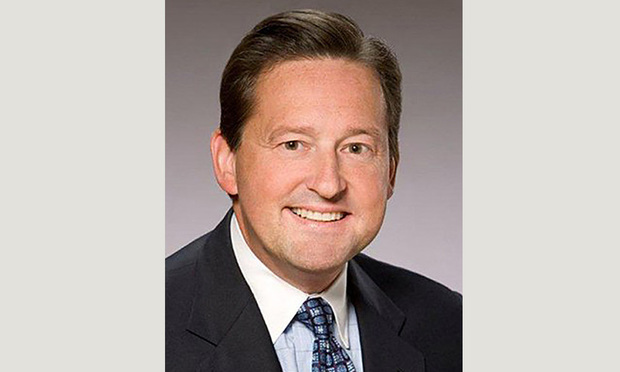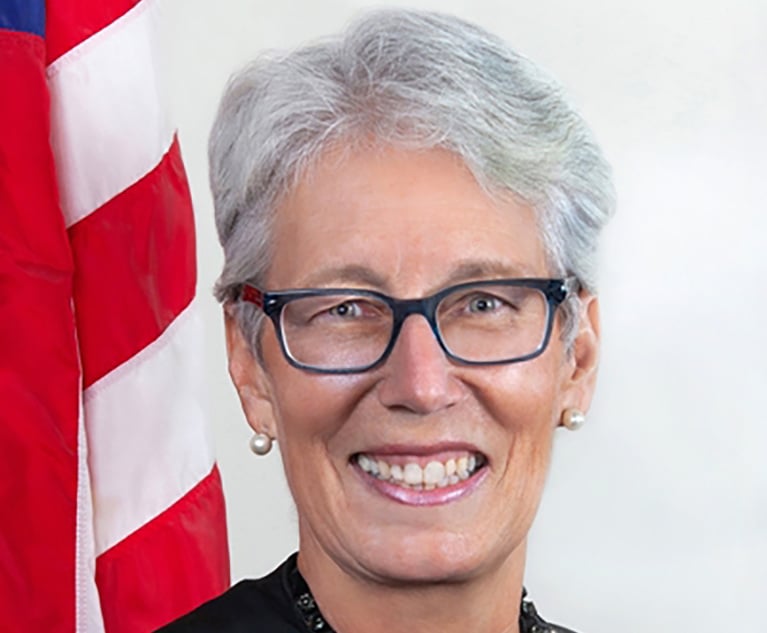Pro-Business Group's Ad Targeting Chancellor Elicits Anger in Delaware
The group's director acknowledged that its members did not want to see Chancellor Andre Bouchard elevated to the Supreme Court, but said the criticisms were a way of raising the issue of judicial diversity.
September 19, 2019 at 04:56 PM
7 minute read
The original version of this story was published on Delaware Law Weekly
 Andre G. Bouchard.
Andre G. Bouchard.
As the selection of Delaware's next chief justice approaches, a political action committee with ties to one of the most vexing business disputes in the recent history of the state has taken aim at the top judge of the Delaware Court of Chancery Court in a bid to keep him off the high court.
Citizens for a Pro-Business Delaware, in an ad that aired at the end of last week's Democratic presidential debate, attacked Chancellor Andre G. Bouchard as a member of the court's "old boy's club," an exclusive group of rich, white and mostly male attorneys that the group says is not representative of Delaware's wider population.
"If you made millions as a corporate lawyer, enjoy dropping thousands at fancy dinners and like to drive cars worth five times what the average Delawarean makes in a year, you seem to be perfect candidate to take over as chief justice of Delaware's Supreme Court," a woman's voice says over flashing images of Rolls Royce cars and Bouchard attending social functions.
The 30-second spot ends with a message calling for more diversity on the high court: "Our court should be representative of the people it serves. Now's the time to all rise for a Supreme Court that's diverse, in touch and fair," the voice says.
The latest salvo in a years-long campaign criticizing Delaware's legal system, Citizens' ad came as Bouchard was rumored to have applied for the job as Delaware's top jurist, following the announcement earlier this year by Chief Justice Leo E. Strine Jr. that he would step down in the fall.
Strine's retirement could potentially open up another seat on the Supreme Court's five-member bench, if Gov. John Carney selects a current justice to replace him. Justice Karen L. Valihura is the only woman currently serving on the state high court, which has never included a person of color among its ranks.
The origin of the feud with Bouchard dates back to his handling of a protracted legal dispute over control of TransPerfect Global Inc., the profitable translation services company that Bouchard ordered to the auction block in 2015 amid an intractable deadlock between CEO Philip R. Shawe and the firm's co-founder and other former owner, Elizabeth Elting.
Shawe has repeatedly and publicly criticized the rare move to appoint a custodian in the case, at times even questioning Bouchard's integrity. Shawe, for his part, remains ensnared in Chancery Court proceedings seeking to hold him in contempt for refusing to pay the fees of custodian Robert B. Pincus, a partner with Bouchard's former firm Skadden, Arps, Slate, Meagher & Flom who was selected to oversee the sale process.
Citizens, meanwhile, operates with the backing of high-ranking and senior TransPerfect employees who say they got a raw deal in the forced sale. The group denies taking any funding or direction from Shawe, who in 2018 won his bid to purchase TransPerfect and now owns the firm outright.
However, the interests of Citizens and its members have often aligned with Shawe, and the group remains critical of what it calls lack of transparency on the Delaware courts.
The ad targeting Bouchard was widely denounced by members of Delaware's tight-knit legal community as an unwarranted attack on a top-quality judge whose ethics and credentials had never been called into doubt outside of the TransPerfect case. Many said the nature of the ad was consistent with the way Shawe had conducted himself throughout the litigation and suspected that he in fact was behind the ad's message.
Others questioned, in strong terms, Citizens' motives in running the ad as the nomination process remains ongoing.
"These people are hypocrites," said Lawrence Hamermesh, a corporate law professor at Widener University Delaware Law School.
"They don't give one rat's ass about diversity. They want retribution against Andy Bouchard," he said.
Francis G.X. Pileggi, vice chair of Eckert Seamans Cherin & Mellott's commercial litigation practice, said it was just another example of "sour grapes" stemming from TransPerfect's legal saga, and he questioned the ad's effectiveness in a state where judges are appointed by the governor, based on the recommendation of a judicial nominating commission.
"They have a lot of money to throw around to express their anger," he said. "The last thing in the world the governor is going to listen to is an out-of-state group trying to tell him how to run his state."
A spokesman for Shawe said he would not be commenting on the content of the ad. Shawe, he said, does "not fund or instruct" the group.
The group's director, Chris Coffey, acknowledged in an interview that the group's members did not want to see Bouchard elevated to the Supreme Court, but said the criticisms were a way of raising the issue of judicial diversity.
"I know the ad was a lot and it's out there, but now at least people are talking about who's on the Supreme Court," he said.
Coffey said Citizens planned to drop its attacks on Bouchard in its next round of advertising but would continue to push themes of diversity, saying the court should include more women and people of color.
Citizens, he said, was also concerned with billing TransPerfect was still being charged from the legal proceedings. To date, Coffey said TransPerfect had paid about $220 million in legal fees, including between $25 million and $40 million in the last two years alone. The bills were not itemized and the details of charges were not publicly available, he said.
"We're going to keep going," Coffey said. "What is wrong in the year 2019 with more transparency?"
Through his spokesman, Shawe said he was contractually permitted to review itemized bills and to challenge their reasonableness "in any competent court."
"At Skadden's behest, this contract was incorporated into the [Sale Purchase Agreement] making it a court order that Skadden is blatantly violating. If there were any justice to be had in Delaware courts, it should be Skadden and Bob Pincus facing sanctions, not TransPerfect and Phil Shawe," Shawe said.
An attorney for Pincus did not return a call seeking comment on Shawe's claims.
Delaware attorneys this week recognized the importance of a diverse judiciary, but rejected the notion that the current composition of the Supreme Court had any impact on the court's ability to decide cases fairly.
They pointed to recent strides on the membership of the expanded Chancery Court, which now includes three women vice chancellors and two female masters in chancery. Tamika Montgomery-Reeves, in 2015, became the first African American to serve on the court.
Support for Bouchard was universal, and William Patrick Brady, president of the Delaware State Bar Association's executive committee, said Thursday that the organization would "be making some sort of response," though he declined to provide details.
"We believe obviously that this campaign against the courts, and the chancellor in particular, is unwarranted," Brady said. "Within the bar, we have the utmost confidence in our courts and our chancellor."
This content has been archived. It is available through our partners, LexisNexis® and Bloomberg Law.
To view this content, please continue to their sites.
Not a Lexis Subscriber?
Subscribe Now
Not a Bloomberg Law Subscriber?
Subscribe Now
NOT FOR REPRINT
© 2025 ALM Global, LLC, All Rights Reserved. Request academic re-use from www.copyright.com. All other uses, submit a request to [email protected]. For more information visit Asset & Logo Licensing.
You Might Like
View All
Attorneys, Professors Share Support for Chancellor Following Musk's Online Attacks
4 minute read

Jurden Announces 2025 Retirement, Capping 24 Years on Superior Court
3 minute read
Trending Stories
- 1Uber Files RICO Suit Against Plaintiff-Side Firms Alleging Fraudulent Injury Claims
- 2The Law Firm Disrupted: Scrutinizing the Elephant More Than the Mouse
- 3Inherent Diminished Value Damages Unavailable to 3rd-Party Claimants, Court Says
- 4Pa. Defense Firm Sued by Client Over Ex-Eagles Player's $43.5M Med Mal Win
- 5Losses Mount at Morris Manning, but Departing Ex-Chair Stays Bullish About His Old Firm's Future
Who Got The Work
J. Brugh Lower of Gibbons has entered an appearance for industrial equipment supplier Devco Corporation in a pending trademark infringement lawsuit. The suit, accusing the defendant of selling knock-off Graco products, was filed Dec. 18 in New Jersey District Court by Rivkin Radler on behalf of Graco Inc. and Graco Minnesota. The case, assigned to U.S. District Judge Zahid N. Quraishi, is 3:24-cv-11294, Graco Inc. et al v. Devco Corporation.
Who Got The Work
Rebecca Maller-Stein and Kent A. Yalowitz of Arnold & Porter Kaye Scholer have entered their appearances for Hanaco Venture Capital and its executives, Lior Prosor and David Frankel, in a pending securities lawsuit. The action, filed on Dec. 24 in New York Southern District Court by Zell, Aron & Co. on behalf of Goldeneye Advisors, accuses the defendants of negligently and fraudulently managing the plaintiff's $1 million investment. The case, assigned to U.S. District Judge Vernon S. Broderick, is 1:24-cv-09918, Goldeneye Advisors, LLC v. Hanaco Venture Capital, Ltd. et al.
Who Got The Work
Attorneys from A&O Shearman has stepped in as defense counsel for Toronto-Dominion Bank and other defendants in a pending securities class action. The suit, filed Dec. 11 in New York Southern District Court by Bleichmar Fonti & Auld, accuses the defendants of concealing the bank's 'pervasive' deficiencies in regards to its compliance with the Bank Secrecy Act and the quality of its anti-money laundering controls. The case, assigned to U.S. District Judge Arun Subramanian, is 1:24-cv-09445, Gonzalez v. The Toronto-Dominion Bank et al.
Who Got The Work
Crown Castle International, a Pennsylvania company providing shared communications infrastructure, has turned to Luke D. Wolf of Gordon Rees Scully Mansukhani to fend off a pending breach-of-contract lawsuit. The court action, filed Nov. 25 in Michigan Eastern District Court by Hooper Hathaway PC on behalf of The Town Residences LLC, accuses Crown Castle of failing to transfer approximately $30,000 in utility payments from T-Mobile in breach of a roof-top lease and assignment agreement. The case, assigned to U.S. District Judge Susan K. Declercq, is 2:24-cv-13131, The Town Residences LLC v. T-Mobile US, Inc. et al.
Who Got The Work
Wilfred P. Coronato and Daniel M. Schwartz of McCarter & English have stepped in as defense counsel to Electrolux Home Products Inc. in a pending product liability lawsuit. The court action, filed Nov. 26 in New York Eastern District Court by Poulos Lopiccolo PC and Nagel Rice LLP on behalf of David Stern, alleges that the defendant's refrigerators’ drawers and shelving repeatedly break and fall apart within months after purchase. The case, assigned to U.S. District Judge Joan M. Azrack, is 2:24-cv-08204, Stern v. Electrolux Home Products, Inc.
Featured Firms
Law Offices of Gary Martin Hays & Associates, P.C.
(470) 294-1674
Law Offices of Mark E. Salomone
(857) 444-6468
Smith & Hassler
(713) 739-1250






